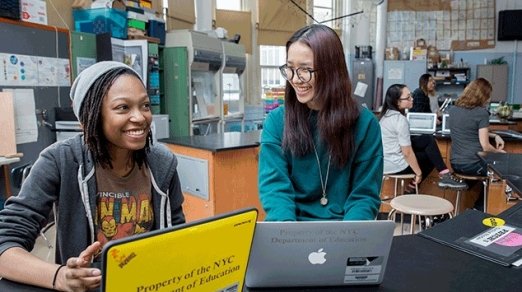Tech visionary says AI, education can bridge digital divide to meet 2030 UN goal
IN BRIEF
- "AI has been here for quite a long time but generative AI has really sparked everyone’s imagination because it has created a whole new creator economy, and I think people understood just how much potential generative AI offers to revolutionize industries."
- "We should always get excited about how the metaverse is going to evolve the education sector and the digital landscape, but we should also keep in mind that initiatives like Giga—bridging the digital divide is important, so that the future of education remains as inclusive as possible."
- "I know, for sure, that there is a lot of brilliant women leaders who are leading the metaverse sector. However, we still have a long way to go because some of the top metaverse platforms are led by men."
Joe Kornik sits down with Amna Usman Chaudhry, a financial economist and strategist for blockchain, the metaverse and Web 3.0, to discuss AI, education, the digital divide and women in the metaverse. Details about Chaudhry’s free masterclass mentioned in the interview can be found here.
In this interview:
- Generative AI’s impact (1:03)
- Education and the digital divide (2:55)
- NFTs importance (5:42)
- Women and the metaverse (8:38)
- The 2035 possibilities (11:02)
Tech visionary says AI, education can bridge digital divide to meet 2030 UN goal
Joe Kornik: Welcome to the VISION by Protiviti Interview. I’m Joe Kornik, Editor-in-Chief of VISION by Protiviti, our global content resource examining big themes that will impact the C-Suite and executive boardrooms worldwide. Today, we’re exploring the metaverse future, and I’m excited to welcome in Amna Usman Chaudhry, a financial economist and strategist for blockchain, the metaverse, and Web 3.0. She’s a graduate-level lecturer with teaching experience in London and Dubai and is working on some impactful projects, including one with the United Nations. Amna has been named one of the top 100 women of the future, the global winner of the Women in Web 3.0 award, and she’s been listed on the Women in FinTech Powerlist. Amna, thank you so much for joining me today.
Amna Usman Chaudhry: Thank you Joe, it’s a pleasure to be here.
Kornik: The metaverse has certainly had its share of ups and downs the last few years, and hype cycles, but so far in 2023, I feel like there’s been a lot of emphasis on AI. In particular, generative AI. So, how do you think AI and generative AI will impact the metaverse?
Chaudhry: So, AI has been here for quite a long time but generative AI has really sparked everyone’s imagination because it has created a whole new creator economy, and I think people understood just how much potential generative AI offers to revolutionize industries. So, I think it’s really exciting and it will definitely have a great impact on the metaverse.
So, for example, imagine you have a dream house and it’s modern, it’s like big windows, maybe there’s a high ceiling, etcetera. So, imagine you type that into a prompt and then you have a virtual representation of that house and then you can invite your friends there and go see it out, and maybe even have your architect there and get an idea of exactly what you want. So, this is where we are going, and this is really exciting because we have a lot of generative AI that deals with text-to-3D.
For example, we have GET3d by NVIDIA, we have Make-A-Video by Meta, we have DreamFusion by Google, and we have so many more as well. This really saves time as well because it’s very time consuming to build a metaverse world. So, when you have this, then they already fast-paced acceleration that’s taking place in the metaverse is accelerated and you can focus on the more important aspects.
Kornik: Right, and I know you’re very passionate about education. Can you talk to us a little bit about what you think the metaverse and Web 3.0 will bring to education in terms of its inclusivity and in terms of leveling the playing field?
Chaudhry: Education is one industry which is still yet to be disrupted properly, and we can see how much there is a need for evolution. Just take the COVID pandemic a few years ago. I know students and children, they had to sit [in form of] screens, and it was really difficult for them to sit all day and understand. So, with the evolution of the metaverse, you could put up a virtual reality headset. You can go in and see the pyramids of Egypt for your history class. You can go to the Jurassic era and see the dinosaurs. You need to kind of put a headset on to see just how immersive it is.
There was actually a study done by PWC which says that virtual reality education is four times better at training than the classroom. Also, the students who take part in it are four times more engaged. It’s actually after a certain number of headsets, 375 headsets, I believe, it is actually cost effective as well when you go into the skill. So, there’s a lot of potential in education.
Now, I think when we talk about emerging technologies, we also need to kind of keep into account that it is inclusive. So, we need to make sure that these technologies are—the emerging tech world is evolving super-fast—so we need to take a step back and look that there are still 2.7 billion people on the planet who do not have access to the internet, and 1.3 billion of those are children. So, this is why initiatives like Giga are so important.
Giga is an initiative by UNICEF and ITU that aims to connect every school in the world to the internet by 2030, and they’re using these latest technologies like NFTs, blockchain, Web 3.0, etcetera, to kind of bring their vision to pass. So, we should always get excited about how the metaverse is going to evolve the education sector and the digital landscape, but we should also keep in mind that initiatives like Giga—bridging the digital divide is important, so that the future of education remains as inclusive as possible.
Kornik: Right, and you mentioned NFTs there. It seems like you think they’re going to be one of the big disruptors, maybe along with blockchain in these immersive spaces in the worlds of Web 3.0 and the metaverse. So, why do you think NFTs are so important?
Chaudhry: There is a lot of benefits of NFTs. I think, previously, I mentioned just with the education as well, NFTs are also being used as tool for good. I think that’s something that is often overlooked and that is something that gets me personally most excited for the potential of why NFTs are so important. NFTs offer the same advantages that blockchain has: transparency, decentralization, security, and they’re one of a kind. So, identification as well.
Going back to the example of NFTs as it were for good, we have, again, Giga where, for UNICEF’s 75th anniversary, they released 1,000 NFTs for the Patchwork Kingdom NFTs, which were made via real data collected from Giga’s Project Connect. What that did was raise more than $700,000 for Giga’s initiative to connect every school in the world to the internet by 2030. Now Giga is coming up with an NFT 2.0 collection, which aims to be the largest open-sourced decentralized database of every school in the world. And eventually, although, it’s not in the plan yet, eventually, there is a possibility of those school NFTs to be digital twins in the metaverse as well.
So, there is a whole evolution. I think the crypto market and the blockchain NFT market has slowed down as compared to last year, but there was a study done by Geneva Research, which was published around mid-2022, which says that around that time, there was 24 million NFT transactions, and in five years alone, that number is going to rise to 40 million NFT transactions. So, the sector is definitely growing. The best part is the fastest growing NFTs are the NFTs that are linked to the metaverse. So, from 2022, 600,000. By five years, 2027, we will have that number to 9.8 million. So, there is immense growth, and NFTs and emerging tech as a whole are definitely an exciting future ahead.
Kornik: Right, and I mentioned in my introduction all of the awards that you’ve won, right? You were named one of the top 100 women of the future, you’re a global winner of the Women in Web 3.0 award. You’ve been named one of the most inspirational women of Web 3.0 and the metaverse. So, I have to ask you as a woman leader in this space, how do you think we’re doing and how optimistic are you about the future of women and diversity in general in the metaverse, and if we’re not where we need to be, how do we get there?
Chaudhry: So, first of all, I’m very excited about the future of the metaverse in terms of female. I know a lot of females who are working in the metaverse sector and it is always amazing to see the brilliant minds who are in the space. So, I know, for sure, that there is a lot of brilliant women leaders who are leading the metaverse sector. However, we still have a long way to go because some of the top metaverse platforms such as Sandbox, Decentraland, and Roblox, etcetera, all of these are led by men. So, we do have—I think we have Everyrealm, which has a female CEO—but majority of the leadership in the other metaverse platforms are still men. We need to encourage women to kind of set up in the metaverse.
Companies also need to have an active DEI (diversity, wquity, inclusion) initiatives within their companies to ensure that these women are working and encouraged to join. There should also be more educational initiatives, more trainings, etcetera, and I think this is the mindset that we had when Women in Tech, the global Women in Tech Movement, collaborated with Giga and set up for women’s day this year an initiative to encourage more women in Web 3.0 and the metaverse. And I am really grateful to be part of that initiative where I’ll be giving a masterclass and cutting everything down to really basic details to kind of encourage more women to come into the metaverse, etcetera, and not just the metaverse, in Web 3.0 as a whole.
Kornik: We actually spoke to Melissa Slaymaker for our program earlier. We did a Q&A with her, who’s the global talent director for Women in Tech. I know you know her as well.
Chaudhry: I know. She’s brilliant as well.
Kornik: Finally, Amna, I just have one more question for you today and that is, if you could just take a look out 2030 or 2035 and tell us what you see when you see the metaverse in those years, what do you think is possible?
Chaundry: I think the future is exciting, especially now that we have generative AI to kind of really accelerate the already fast pace of the metaverse. So, imagine, Joe, that you can sit in your TV lounge and switch on the TV. So, in 2035, you will switch on the TV and then there will be a whole metaverse around you, and if you’re watching an ad on coffee, you would be able to smell it. I know this might sound farfetched but these technologies are actually here in 2023.
So, for example, LG TV is working on a metaverse-based TV called Sansar, and then you have the smell of the metaverse technologies such as OVR technology. So, these very much exist. So, everything would be much more immersive by 2035. The healthcare sector would be really benefiting from virtual realities. Sustainability would be benefiting from the metaverse as well. Not just in terms of carbon emissions. Digital twin technology, it would be the norm, and hopefully, by then the education sector would be more inclusive as well, because like I mentioned, Giga aims to connect every school in the world by 2030. So, hopefully, by 2035, the digital divide would be much, much less. So, there is a lot of hope for the future.
Kornik: Right. The promise of the metaverse being a great leveling of the playing field or the great equalizer in terms of opportunities from a global perspective. Amna, thank you so much for joining me today. I really appreciate it.
Chaudhry: Thank you, Joe. I really enjoyed it.<>Joe: And thank you for watching the VISION by Protiviti Interview. I’m Joe Kornik. We’ll see you next time.
Did you enjoy this content? For more like this, subscribe to the VISION by Protiviti newsletter.



































